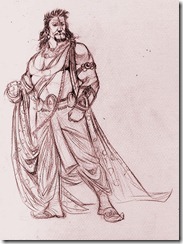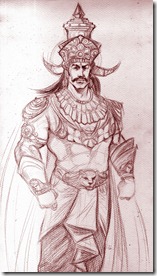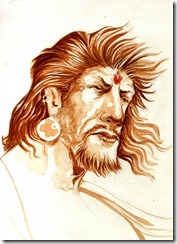Don’t you think so? I have always enjoyed figuring out my villains and why they do things that they do. Are they inherently evil or are they just misled? What is it they are fighting? Because fight they do, constantly, against social norms and status quos.
During writing Krishna, I met many villains, each with a different point of view, with a twisted (not necessarily a bad twist) philosophy and something ‘bad’ that they would have done. Krishna would punish them, decisively, unquestionably, with righteousness. He had to, since he was restoring dharma, a philosophy to prosper civilization, bring justice and equality. Personally, I am not sure how much I would agree to his ideology but I know there are millions in India who would still consider his path the status quo.
For me, each of these so called villains were point of views – different from Krishna’s ideology—which come in the mythology. They are punished, sometimes undeservingly, but their philosophies are never explored more in the story.
Take Kansa for example. Is he really the evil uncle? Or is there more to him? By not respecting Indra, is he actually fighting a war against the hierarchy and unfairness of gods who have labelled him and the demon clan inherently evil? Are these not his gods, but of others who are alien to him? We never find out his point of view, just broken parts of it, as the mythology is not about him but Krishna.
Then there’s Jarasandha. He’s a good king, his kingdom is prosperous. His rule is just. He’s powerful and has a mighty army, so refuses to bow down. Why does Krishna want him dead? The given reason is that he has captured princes of other kingdoms after defeating them, but frankly even in the Purana, it doesn’t feel like a good enough reason. Krishna devises a convoluted, sneaky way of killing off the mighty king. I wanted to find out more about Jarasandha, but unfortunately, yet again, our mythology is more focused on Vishnu’s avatar.
In both these cases, are villains just the other point of view, a view which might be an alien culture, a different way of civilization or simply the unknown? While writing this book, it was difficult for me not to ask these questions. I hope these cracks show through in the book as well. Have you read the book? Did you see these cracks?
All sketches are drawn by Rajesh N and are copyrights of Campfire




